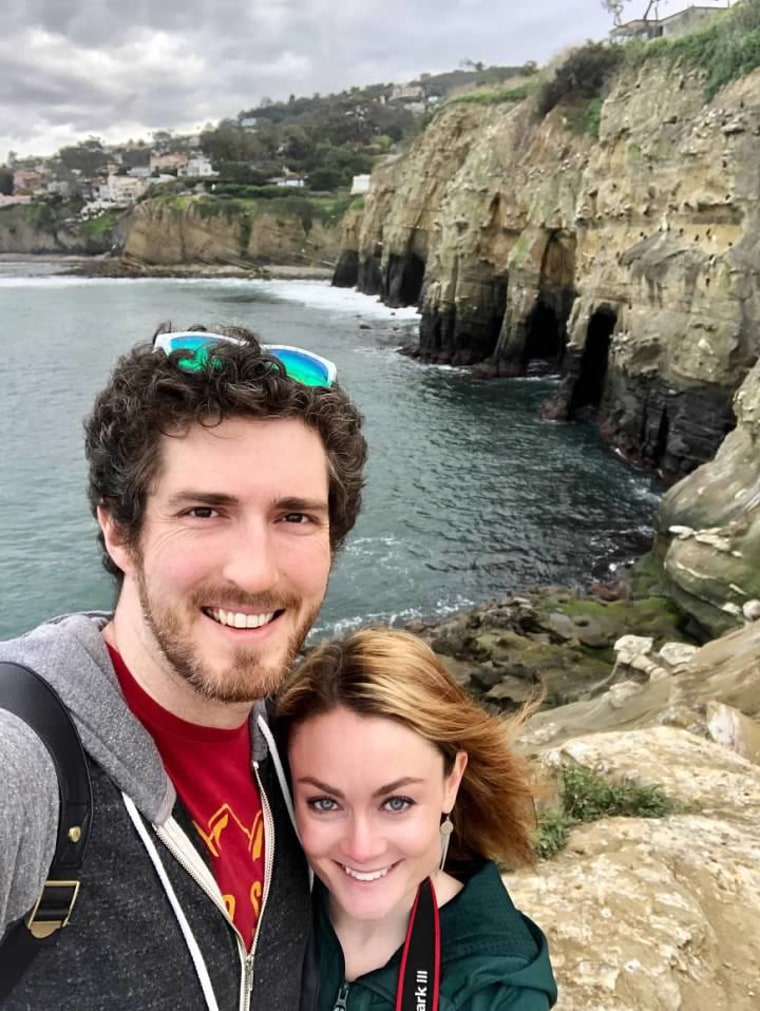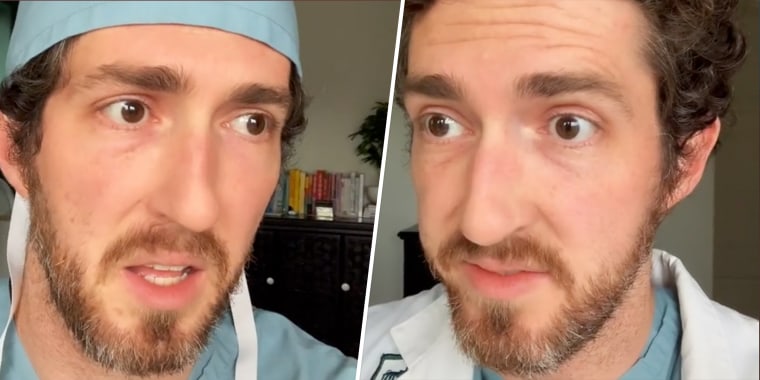Dr. Will Flanary likes to joke that he tries to die every four to five years and his wife is starting to get sick of it.
The ophthalmologist has a huge social media following as “Dr. Glaucomflecken” — his alter ego who makes fun of the craziness of the medical world in viral TikTok videos. The skits spoof doctors, hospital administrators and insurance executives. Flanary plays every character, helped by great comedic timing, an expressive face and a few props.
But Flanary’s own medical history is much more serious. At 36, he has survived testicular cancer twice and suffered a cardiac arrest last year out of the blue. His wife, Kristin, saved his life.
“I use comedy to cope with my own health issues,” Flanary, who practices in Oregon City, Oregon, told TODAY. “It helps to laugh in the face of pretty difficult situations.”
He was just 25 when he found out he had testicular cancer for the first time — a diagnosis that came out of nowhere, he recalled. Flanary had been a healthy, athletic man with no family history of the disease.
Indeed, testicular cancer has few risk factors that make a man more likely to develop it, the American Cancer Society noted. The disease mainly affects men between the ages of 20 and 39, according to the U.S. National Library of Medicine.
“I noticed one morning that it felt like my testicle was trying to grow another testicle. I was just a third-year med student, but I knew enough to know that wasn’t supposed to happen,” he recalled.
“It’s really hard having a diagnosis like that in your 20s because when you’re in your 20s, you have this sense of invincibility, like nothing can hurt you, you’ll never get sick. Then all of a sudden, it just comes crashing down on you.”
The cancer was a stage 1A seminoma, which can be cured in almost all patients. Flanary underwent surgery to remove the testicle and resumed his normal life.
About five years later, when he was in medical residency, Flanary once again felt a lump. Only 1% to 2% of testicular cancer survivors develop cancer in the other testicle, so it seemed impossible that he’d have to go through the experience again, but an ultrasound confirmed it.
The diagnosis was a stage 1B seminoma with some evidence of a lymphatic invasion, but this time around, there were more serious questions to consider about surgery. Losing one testicle usually has little effect on a man’s life, but when both are gone, he becomes infertile and can’t make enough testosterone, which affects his ability to have sex.
Flanary and his wife had two children — were they done having kids? He’d have to be on testosterone replacement therapy — what would that be like?
“The second time was much harder,” Flanary recalled about the cancer. “Life was just more complicated at that point.”
He decided to go through with the surgery to ensure the cancer was completely gone. His hormone replacement therapy means a weekly injection of testosterone, which he gives himself: “It’s so easy even an ophthalmologist can do it,” Flanary said.

He banked sperm for a while, but stopped when he and his wife decided their family of four was complete.
The eye doctor urged men to know what their testicles normally feel like, so that if something suddenly feels different, they can recognize it. “No one knows your testicles better than you, more than likely,” he said. “Once a month, just check yourself.”
Flanary caught his cancer relatively early both times and was able to avoid chemotherapy or radiation.
Cardiac arrest mystery
But in May of 2020, he endured another serious medical crisis: His heart suddenly stopped in the middle of the night. Unconscious, Flanary gasped for breath, which woke up his wife. She performed CPR for 10 minutes until paramedics arrived and resuscitated him. He calls her a “superhero.”

At the hospital, Flanary received targeted hypothermia treatment, which involved cooling his body for 24 hours to reduce damage to the brain after a cardiac arrest. He made a full recovery and was able to resume his life, though he now has a defibrillator to protect him if his heart were to stop again.
There’s no explanation for the cardiac arrest. A cardiac MRI and other tests were normal so the frightening episode is a mystery.
Viral video star
Since Flanary likes to fuse comedy with medicine, he worked that experience into some of his social media posts, too. But his most popular clips feature various doctors and the tensions between them, which he regularly spoofs in his videos.
The different medical specialties and the personalities they attract “have been the same since the beginning of time,” he said. Simple props and costumes help complete the caricatures.
His emergency doctor character always wears biking gear, for example, because ER docs are known for thriving on adrenaline, so they like to bike ride or climb mountains, Flanary said.
His kidney doctor character carries around containers of salt because nephrologists deal with electrolytes, fluid balances and sodium.
That constantly annoys the cardiologist, who hates salt because it raises a patient’s blood pressure.
Flanary portrays the cardiologist as a scary figure based on his own experience with the specialty as a medical student.
“The cardiologists were very busy and so they are a little stern, a little abrupt, sometimes mean to you when you try to give them more work to do,” he recalled.
“Obviously, (the skits) are embellished for the sake of comedy. There’s nobody that’s really exactly like these characters in the hospital, but pretty close, pretty close.”
Doctors and nurses recognize themselves and their colleagues in the videos, Flanary said, so he gets lots of positive feedback about the clips. He, in turn, now gets recognized at medical conferences and is thankful for the support he gets from his social media fans.
“It’s really helped me because I enjoy making people laugh,” he said.

